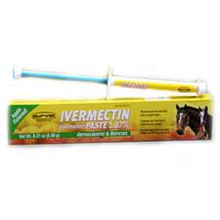In the American Horse Publications (AHP) second online nationwide equine industry survey conducted earlier this year, a set of horse health questions focused on deworming.

Ivermectin - Dewormer of choice for horses
When asked how often an individual deworms their horses, the most common responses were four times per year and every other month which corresponds to the standard rotational worming management strategy.
When asked how often an individual deworms their horses, the most common responses (which occurred in roughly equal percentages) are four times per year and every other month (or 6 times per year, which corresponds to the standard rotational worming management strategy).
Only 0.6% of respondents indicate that they never deworm their horses. Respondents also chose the "Other" category often (14.3%), and the most common responses were "As needed, based on fecal egg count" or "I use a daily dewormer."
Over 88% of respondents deworm the horses in their care themselves; 6.7% have their barn managers deworm.
Nearly all horse owners and managers that deworm their horses use a tube/paste dewormer (97.2%); a decreasing percentage (5.7%) are using a daily dewormer. In addition, over 83% of those that use a daily dewormer also use a tube/paste dewormer. 44.3% of respondents (up from 15.7% in the 2009-2010 study) indicate that their veterinarian is involved in developing their horses’ deworming schedules.
Nearly 80% of respondents indicate that they are concerned about drug resistance in parasites. About 50% indicated that their veterinarian had recommended a fecal egg count; about 50% had actually had a fecal egg count performed.
Ivermectin is the most frequently used dewormer (77.5%), followed by ivermectin/praziquantel (66.4%), pyrantel pamoate (57.8%), and fenbendazole (54.6%). Moxidectin (28.6%), moxidectin/praziquantel (24.3%), oxibendazole (23.1%), and pyrantel tartrate (9.8%) are used less frequently.
Nearly 60% of respondents most frequently purchase dewormers at local feed stores; online websites are the second most frequently identified source for purchasing dewormers (45.4%). Veterinarians have the largest source of influence on which dewormers are purchased (38.6%); in addition, price is a common determinant in which dewormers are selected (20.9%).
